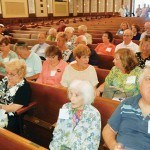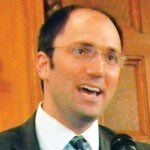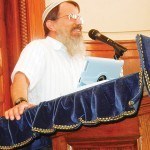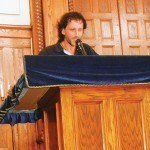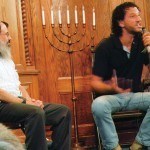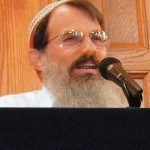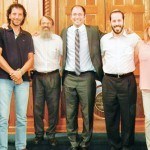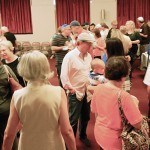Click on each photo to enlarge.
- Crowd begins to form in anticipation of the discussion about the current state of affairs in Israel.
- Rabbi Ari Saks introduces the speakers
- Rabbi Hanan Schlesinger addresses the crowd.
- Ali Abu Awwad speaks during the discussion at Beth Mordecai
- In a more casual moment, both speakers, Rabbi Hanan Schlesinger, left, and Ali Abu Awwad discuss the topic of conflict in Israel.
- Rabbi Hanan Schlesinger, one of the two discussion speakers
- Group photo
- After the discussion ended there was a reception in Safran Hall. *Photos by Ron Miskoff
By Ron Miskoff
PERTH AMBOY – An orthodox rabbi and a Palestinian walk into a synagogue…. It sounds like the beginning of a joke, but this was real. On Sunday, Sept. 7, exactly that combination presented a talk at Congregation Beth Mordecai, 224 High St., on the sensitive and dangerous situation in the Middle East.
Rabbi Hanan Schlesinger, who resides both in Israel and New York, discussed the exasperating status of Israeli-Palestinian relations with Ali Abu Awwad, a leading Palestinian peace advocate, before a crowd of about 115. The discussion was free and open to the public.
It was not a debate because both participants agreed on the basic principle of their appearance — that all sides in the Israeli-Palestinian conflict need to develop a leap of faith to trust one another. In turn, they said, understanding will lead to peace.
The theme was set at the beginning by Rabbi Ari Saks, the religious leader of Beth Mordecai, when, in introducing Schlesinger and Awwad, he said, “Peace means you give up what I want, and I give up what you want — and neither of us is happy. But that’s peace.”
Saks invited the two speakers to Perth Amboy. They are on a tour to help educate the public about the current situation in the Middle East.
Schlesinger said, “Is it possible to learn about someone else and still be true to yourself?”
That point essentially governed the discussion. Initially it seemed that the two men were going to hold a debate, but they appeared to agree on every point. They said they are friends, have known each other for several years and live near each other in Israel.
Schlesinger, a diminutive, greying man appeared in stark contrast to Awwad, who was much taller. Both wore beards and were dressed casually.
Speaking on the “bema” or elevated platform in the main sanctuary of the 115-year-old temple, Schelsinger said he had a “personal transformation” and was “rocked” by his relationship with Awwad, whom he referred to during the talk by his first name, “Ali.”
He said the lack of understanding between Palestinians and Jews stems from the essential separateness of the two cultures. They live among each other in some parts of Israel, Schelsinger said, but they have different municipal services, their children go to different schools, and they seldom if ever talk to each other. He and Awwad have been trying to change pattern.
Awwad, in turn, said that most Palestinians truly want to be “pro-solution,” but Israelis continue to fear Palestinians. This leads to “pain, anger and blood,” he said, and the result is, “We are dying.”
In an impassioned description of his background, Awwad said that he became involved in the conflict over his family as a young man. He was separated from his mother, who was an activist, for two months, and when he was released from jail, he decided to become involved in politics. He realized, he said, that violence does not help resolve issues, especially between two groups that have literally thousands of years of hatred between them.
He went on a 17-day hunger strike to be allowed to visit his mother, he said.
“What is the danger to Israel for me to visit my mother?” he asked.
He said that he came to realize, “Human beings are susceptible to being shown what they have done and to take responsibility for their acts.”
After so many years of conflict, Awwad said, “the Palestinian people have become confused over who they are. We have never had peace.”
He compared the situation in the Middle East to Perth Amboy, where people do not have to worry that they will be shelled with bombs in their sleep or not be able to travel a short distance without being searched and delayed for hours by guards at check points.
He said his brother was killed by an Israeli patrol.
“I promise you,” Awwad said, “I can give up anything to get my brother back, but I guarantee you he will never be back.”
Awwad said a turning point came for him when he found himself in the proximity of a group of Israelis whose family members had been killed. Everyone was bereaved, he said.
“It was the first time I realized that Israelis had feelings,” he said.
That simple understanding showed, Awwad pointed out, that there exists a gigantic gulf of misunderstanding between two warring parties in the Middle East.
“It was the first time I saw a Jew as a victim,” he said.
The two speakers decided at one point to go on this speaking tour to explain that it is the lack of sympathy with fellow human beings that is driving the war. Deep emotion keeps the conflict alive, Awwad said.
“Rockets are the consequences of one-sided solutions,” he added.
Schlesinger discussed some experiences he had regarding misunderstandings between Arabs and Jews.
“What we [Jews] believe is true,” he said, “but there is another truth. It is easy to ignore the other truth. Many Palestinians don’t see our truth, and my truth has caused them pain and suffering.”
The two men almost seemed to be completing each other’s sentences. They agreed that the lack of understanding is causing most problems in the Middle East.
The talk was co-sponsored by Beth Mordecai, the Jewish Federation of Greater Middlesex, Congregation Neve Shalom in Metuchen, Temple Emanu-El of Edison, and the Jewish Community Center of Middlesex County.
The ecumenical nature of the talk served to show that the Jewish community is seeking new ideas to resolve differences over strife in the Middle East. After the talk, many participants embraced each other, and cookies and fruit were served in Safran Hall, adjacent to the sanctuary at Beth Mordecai.
Scheslinger and Awwad are part of a movement whose website is called friendsofroots.net in Reston, Va.


